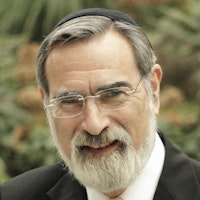Society, I argue, is the home we build together: Christians, Jews, Hindus, Sikhs, Muslims, atheists, agnostics and secular humanists.
Society, I argue, is the home we build together: Christians, Jews, Hindus, Sikhs, Muslims, atheists, agnostics and secular humanists.
Jonathan Sacks

The Home We Build Together
Theme: Regenerative Economics
Society, I argue, is the home we build together: Christians, Jews, Hindus, Sikhs, Muslims, atheists, agnostics and secular humanists. To do this we need a shared language. The democratic conversation must include all of us. We must be prepared to explain ourselves to one another, and to listen to one another. Because we are different, each of us has something unique to contribute. What matters is that we contribute—to society as a whole, not just to our particular subsection of it.
Jonathan Henry Sacks, Baron Sacks, was born on March 8, 1948, in Lambeth, London. He became a notable British Orthodox rabbi, philosopher, theologian, author, and politician. From 1991 to 2013, he served as the Chief Rabbi of the United Hebrew Congregations of the Commonwealth, playing a pivotal role in guiding and representing Jewish communities across the region.
Beyond his leadership in the Jewish community, Sacks was deeply passionate about character education, morality, and the importance of family. He frequently emphasized the role of ethical teachings in forming well-rounded individuals and believed in the necessity of strong family bonds for a stable society. An accomplished author, his books often explored the intersections of faith, morality, and contemporary challenges, aiming to make religious insights relevant to a wide audience. These works not only resonated within religious circles but also found acclaim in academic and political spheres due to their timely and profound insights.
Sacks passed away on November 7, 2020, in London. His legacy, marked by interfaith dialogue, advocacy for character education, and a steadfast commitment to the Jewish community, continues to inspire many. He is survived by his wife, Elaine Taylor Sacks, whom he married in 1970.
The Home We Build Together
Sacks, Jonathan. The Home We Build Together: Recreating Society. Continuum, 2009, p. 12 [Jonathan Sacks, The Home We Build Together (Chapter 1)].

Jonathan Sacks
Theme: Regenerative Economics

About This Rabbi Jonathan Sacks Quotation [Commentary]
Jonathan Sacks articulates a vision of society as a collective endeavor where every individual, regardless of their religious or secular identity, contributes to a shared living space. He emphasizes the necessity of a “shared language,” a metaphor for mutual understanding and communication that transcends individual differences. This dialogue is not merely about speaking but also about listening and being willing to explain oneself to others. Sacks advocates for an inclusive “democratic conversation” where diverse voices are not only heard but are integral to the societal narrative. Each person’s unique perspective and experience enrich the collective, making society more robust and cohesive.
Regenerative economics, a concept that might initially seem distinct from Sacks’ social vision, actually resonates deeply with it. This economic approach emphasizes systems that are sustainable, self-renewing, and built on the principles of equity and ecological integrity. Like Sacks’ ideal society, regenerative economics values the contributions of all participants, recognizing that diversity and interconnectivity are strengths that drive collective well-being and resilience. It seeks to create economic structures where resources are not merely used but are renewed in ways that benefit the entire community.
Linking these ideas, Jonathan Sacks’ perspective on society mirrors the foundational principles of regenerative economics through the lens of communal responsibility and mutual respect. Both views advocate for systems—social and economic—that are not exploitative but are nurturing and supportive, ensuring that all members contribute to and benefit from the system. Sacks’ emphasis on a society that listens, communicates, and values every individual’s contribution forms a perfect parallel to an economic system that aims to regenerate and sustain itself by respecting and utilizing the diverse capacities of its participants. This synergy highlights a model of living where social harmony and economic sustainability are intertwined, each reinforcing the other in a continuous cycle of growth and renewal.
Additional Jonathan Sacks Quotes
Resources
Related Quotes
Copyright © 2017 – 2026 LuminaryQuotes.com About Us